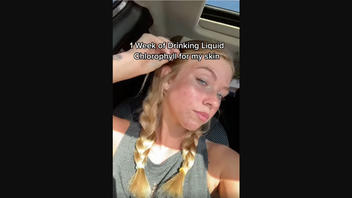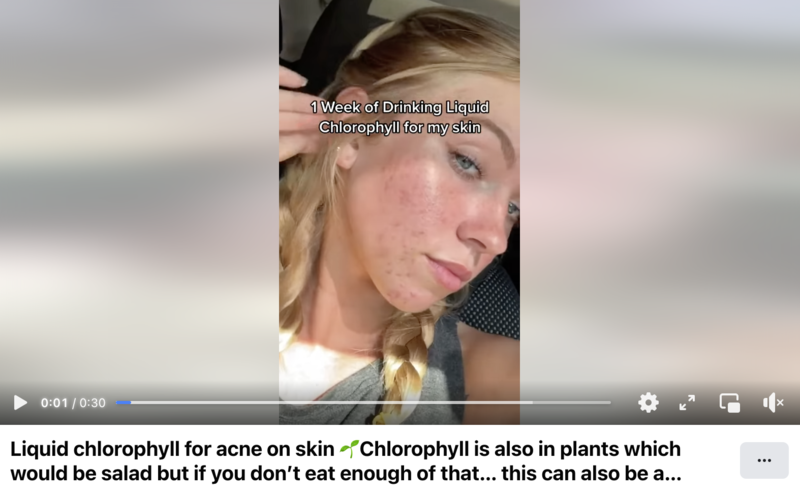
Does liquid chlorophyll heal acne on the skin? No, that's not true: The director of clinical trials for the dermatology department of the University of Pittsburgh Medical Center told Lead Stories that no data from clinical trials support drinking chlorophyll. An Academy of Nutrition and Dietetics spokesperson said drinking chlorophyll can have adverse effects.
The claim appeared in a Facebook reel on July 21, 2022. The caption read:
Liquid chlorophyll for acne on skin 🌱Chlorophyll is also in plants which would be salad but if you don't eat enough of that... this can also be a alternative. Thank me later 😏 #liquid #liquidchlorophyll #chlorophyll #plantsofinstagram #plantbased #tryit #educateyourself #learn #healthylifestyle #healthinspiration #healthinfluencer #influencer #houston #texas #kansascity #motivation #easy #reelsinstagram #viral #explorepage #explore #fyp #fypage #acne #badskin #detox #toxins
This is what the post looked like on Facebook on August 22, 2022:
(Source: Facebook screenshot taken on Fri Aug 22 19:26:26 2022 UTC)
The 30-second video opens with a woman turning her head to display acne on her face from multiple angles with text that reads:
1 Week of Drinking Liquid Chlorophyll for my skin
By the end of the video, the pimples on her face are "no longer active," and the acne on her face has purportedly been cleared up.
In an August 22, 2022, email to Lead Stories, Dr. Laura Ferris, who is the director of clinical trials for the dermatology department of the University of Pittsburgh Medical Center and professor at the University's Clinical and Translational Science Institute, said the video displayed no evidence of acne clearing up. There is no data to support drinking liquid chlorophyll and seeing rapid results, she said:
I see some small studies showing that Chlorophyll or chlorophyllin can kill Propionibacterium acnes (the bacteria involved in acne) in vitro (in a dish not in humans) and some data showing that topical chlorophyll can be used to sensitize the skin to light and be used in a treatment called photodynamic therapy for acne. No data from clinical trials to support drinking it and having acne rapidly clear. I would also say that the video you sent did not show a patient who experienced skin clearance. Acne can fluctuate in severity week to week and the changes noted could be totally due to fluctuations in acne severity and unrelated to chlorophyll. Without rigorous randomized clinical trials, it is not possible to say that a treatment works for acne with certainty.
In an August 22, 2022, email from Monique Richard, a registered dietitian nutritionist and national media spokesperson of the Academy of Nutrition and Dietetics, told Lead Stories that drinking liquid chlorophyll could have adverse effects. She instead suggested investing in a healthy diet that is not made up of isolated, concentrated supplements:
Ingestion of chlorophyll, a group of green pigments found in photosynthetic organisms, aka plants, when taken orally and appropriately in amounts commonly found in foods is likely safe, however there is little research that consuming concentrated amounts of liquid chlorophyll orally is an effective treatment for acne. Most research, although still limited and emerging, has been related to applying chlorophyll topically, which may be a safe and effective treatment for conditions such as acne.
https://pubmed.ncbi.nlm.nih.gov/24930587/
https://naturalmedicines.therapeuticresearch.com/references.aspx?productid=712&highlighted=41896#41896
A common adverse effect of oral intake noted is photosensitization and pseudo porphyria when applying topically.
Since research is limited, there are no standard dosing recommendations.
In addition, liquid chlorophyll may interact with methotrexate, photosensitizing drugs and photosensitizing herbs.
https://naturalmedicines.therapeuticresearch.com/references.aspx?productid=712&highlighted=93892#93892
https://naturalmedicines.therapeuticresearch.com/references.aspx?productid=626&highlighted=1326#1326
Research has found that no more than about 5% of ingested chlorophyll phytol is absorbed, with 95% being excreted in humans https://pubmed.ncbi.nlm.nih.gov/4177872/
As a registered dietitian nutritionist (RDN), I encourage people to invest in their diet versus isolated concentrated supplements not evidenced as efficacious from the scientific literature. Spending money at the farmer's market, produce stands, or grocery stores on leafy greens, colorful fruits and vegetables, will provide the most benefit. Since plants are naturally high in not only chlorophyll, but also antioxidants and beneficial vitamins and minerals like C, zinc, magnesium, potassium and selenium that benefit the health of our skin as well as the function and protection of all of our other organs.
Vegetables rich in chlorophyll include green leafy vegetables, wheatgrass, green tea, potatoes, and some algae and herbs https://naturalmedicines.therapeuticresearch.com/references.aspx?productid=712&highlighted=41865#41865
Skin health is also related to our gut health, inflammation and microbiota profile. The fiber, nutrients, water content and anti-inflammatory benefits of fruits and vegetables further support skin health, clarity, balance and prevention of bacterial and pathogenic activity. Meeting with an RDN and your healthcare professional team to further investigate how your diet and lifestyle can alleviate skin concerns such as acne will yield the best individualized, personalized plan for you and your needs.
In this April 22, 2021, article titled, "TikTok users insist chlorophyll water is healing their acne, but a dermatologist says it's no more effective than plain water," Dr. Muneeb Shah, a dermatologist who is also popular on the TikTok platform, similarly said there is no research to substantiate the effectiveness of liquid chlorophyll and cautioned consumers of adverse reactions.


















